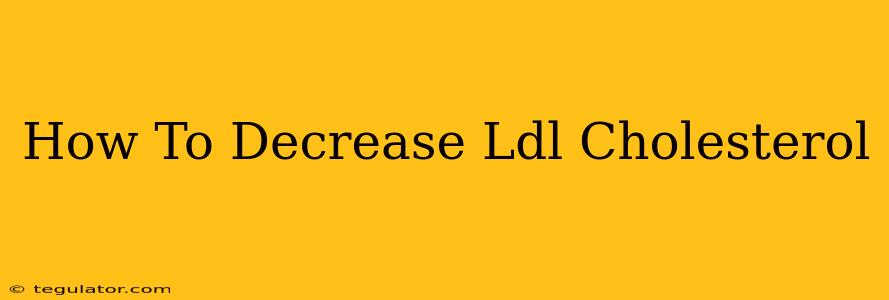High LDL cholesterol, often called "bad" cholesterol, is a significant risk factor for heart disease and stroke. Understanding how to decrease LDL cholesterol is crucial for maintaining your cardiovascular health. This comprehensive guide explores effective strategies to lower your LDL levels naturally and through medical intervention.
Understanding LDL Cholesterol and its Dangers
Before diving into solutions, let's clarify what LDL cholesterol is and why it's so important to manage. LDL cholesterol transports cholesterol from the liver to cells throughout your body. When there's too much LDL, it can build up in the arteries, forming plaque that hardens and narrows the arteries (atherosclerosis). This process restricts blood flow, increasing your risk of:
- Heart attack: Reduced blood flow to the heart.
- Stroke: Reduced blood flow to the brain.
- Peripheral artery disease (PAD): Reduced blood flow to the limbs.
Lifestyle Changes to Lower LDL Cholesterol Naturally
Many lifestyle modifications can significantly impact your LDL levels. These changes are often the first line of defense before resorting to medication.
1. Dietary Adjustments: The Cornerstone of Lowering LDL
Your diet plays a crucial role in managing cholesterol. Focus on incorporating these changes:
- Reduce Saturated and Trans Fats: These fats significantly raise LDL cholesterol. Limit foods like red meat, full-fat dairy products, processed snacks, and fried foods.
- Increase Soluble Fiber: Soluble fiber binds to cholesterol in the digestive tract, preventing its absorption. Excellent sources include oats, barley, apples, beans, and lentils.
- Embrace Foods Rich in Omega-3 Fatty Acids: These healthy fats can help lower triglycerides and slightly raise HDL ("good") cholesterol. Fatty fish like salmon, mackerel, and tuna are excellent choices.
- Boost Your Intake of Plant Sterols and Stanols: These compounds found in some plant-based foods and supplements can help block cholesterol absorption.
- Increase Your Fruit and Vegetable Intake: Fruits and vegetables are packed with vitamins, minerals, and fiber, all beneficial for heart health.
2. Regular Exercise: More Than Just Weight Management
Regular physical activity not only helps manage weight but also directly impacts cholesterol levels. Aim for at least 150 minutes of moderate-intensity aerobic exercise or 75 minutes of vigorous-intensity aerobic exercise per week, along with strength training twice a week.
3. Weight Management: A Significant Factor
Maintaining a healthy weight is essential for overall cardiovascular health. Even modest weight loss can significantly reduce LDL cholesterol levels.
4. Quit Smoking: An Immediate Impact
Smoking damages blood vessels and increases LDL cholesterol. Quitting is one of the most impactful steps you can take to improve your heart health.
Medical Interventions for Lowering LDL Cholesterol
If lifestyle changes aren't enough to lower your LDL cholesterol to a healthy level, your doctor might recommend medication.
- Statins: These are the most common drugs prescribed to lower LDL cholesterol. They work by inhibiting the production of cholesterol in the liver.
- Bile acid sequestrants: These medications bind to bile acids in the digestive tract, preventing cholesterol reabsorption.
- PCSK9 inhibitors: These newer medications are highly effective but more expensive. They work by blocking a protein that regulates cholesterol production.
- Ezetimibe: This medication works by blocking cholesterol absorption in the intestines.
Monitoring Your LDL Cholesterol Levels
Regular monitoring is key to managing your LDL cholesterol. Your doctor will perform blood tests to check your cholesterol levels and assess the effectiveness of your treatment plan. Work closely with your doctor to develop a personalized plan that addresses your individual needs and risk factors.
Conclusion: Taking Control of Your Heart Health
Lowering LDL cholesterol is a crucial step in preventing heart disease and stroke. By combining lifestyle changes with medical interventions when necessary, you can take control of your heart health and significantly reduce your risk of cardiovascular events. Remember, consistency and adherence to your plan are vital for long-term success. Consult your doctor for personalized advice and regular monitoring.

